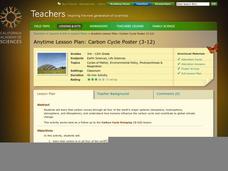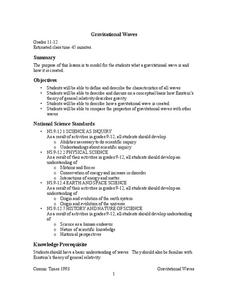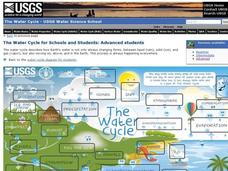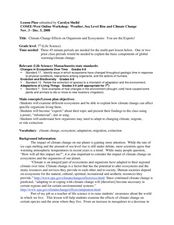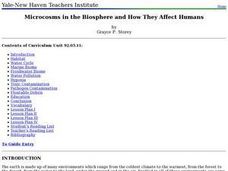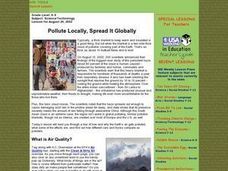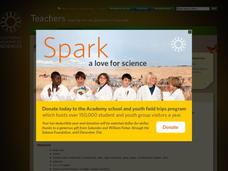CK-12 Foundation
CK-12 Earth Science Concepts for Middle School
Explore a variety of science concepts in an interactive textbook created for middle school scholars. A lengthy table of contents takes readers to pages comprised of a subject overview, outline, and summary. Follow links further to find...
National Wildlife Federation
Quantifying Land Changes Over Time Using Landsat
"Humans have become a geologic agent comparable to erosion and [volcanic] eruptions ..." Paul J. Crutzen, a Nobel Prize-winning atmospheric chemist. Using Landsat imagery, scholars create a grid showing land use type, such as urban,...
Chicago Botanic Garden
Greenhouse Gas Emissions – Natural and Human Causes
Part three in the series of seven has pupils discussing the different greenhouses gases, learning about the carbon cycle, and then watching a short video about the carbon cycle. Based on their knowledge, individuals complete a greenhouse...
Global Change
Impact of Climate Change on the Desert Pupfish
A fish that lives in the desert? You and your class can meet the desert pupfish as they examine its habitat, the role humans play in diminishing water supplies, and how climate change might impact this fishy friend. There are four short...
California Academy of Science
Carbon Cycle Poster
Humans can have a big impact on the environment, specifically the influence they have on the carbon cycle. First, the class will define and discuss each of the earths four major spheres, the biosphere, hydrosphere, atmosphere, and...
Curated OER
Carbon Cycles
Middle schoolers examine the carbon cycle and how carbon atoms travel through it. In this energy cycles lesson students describe how human activities affect the carbon cycle.
Chicago Botanic Garden
Personal Choices and the Planet
The last activity in the series of four has individuals determine steps they can take to reduce their carbon footprints and then analyze their schools' recycling programs. Through a sustainability audit, they identify how and where their...
Curated OER
Human Impact on the Atmosphere
Ninth graders work in group to find information on the internet related to one air quality topic (ie what causes poor air quality, how can we prevent poor air quality). The information is summarized in a series of billboards dealing with...
Curated OER
Life in a Hurricane Zone
Learners research the effects of living in a hurricane zone. In this hurricane zone instructional activity, students research the impact of natural disasters on humans and the environment, and write a press release describing the...
NASA
Gravitational Waves
Young scientists participate in a hands-on experiment to explore Einstein's theory of relativity in a creative manner. They investigate various waves and compare their characteristics as they discuss how each wave is created. Next,...
Curated OER
Population Impact on the Environment
In this population impact activity, students investigate how the growth in human population has contributed to certain effects on the environment. This activity has 5 short answer and 4 fill in the blank questions.
Curated OER
Global Resources: What Will You Do with Your Power?
Students examine the human impact on natural resources. They read and discuss an article, evaluate nations regarding their environmental problem-solving, develop a presidential speech on the environment, and conduct a natural resources...
Curated OER
Climate Change
Young scholars focus on the production of maple syrup in Northern New England as they study the effects of climate change. They investigate other environmental factors on the forests of Northern New England.
US Geological Survey
The Water Cycle for Schools: Advanced Ages
Explore the water cycle in an interactive diagram of the process. The diagram shows how water is a moving system and constantly changing forms. The resourc includes vocabulary words that pupils click on in order to discover more about...
Equality and Human Rights Commission
Actions and Consequences
Even the smallest actions can produce big consequences! Explore the results of both good and bad actions through an engaging activity. Grouped pupils analyze scenarios to examine the physical and emotional outcomes of teasing, bullying,...
Curated OER
Climate Change Effects on Organisms and Ecosystems: You are the Experts!
Seventh graders research about the effect of climate on different ecosystems. In this life science lesson, 7th graders present their research by creating a poster, infomercial, skit or song. They discuss how organisms adapt to climate...
Curated OER
Science: Microcosms in the Biosphere
In a series of lessons, examine the impact on humans by microcosms in the biosphere. Among the plans structured for young scholars with different abilities and learning styles, are activities describing the symbiotic relationship,...
Curated OER
Defining Drought
High schoolers examine the hydrologic impacts of drought. Humans can change the course of the water cycle, to some extent, to meet their needs, but can they do so without imposing risks on the plants and animals?
Orange County Water Atlas
Location, Location, Location…
Young geographers discover not only how to read and recognize coordinates on a map, but also gain a deeper understanding of latitude and longitude and how climate changes can vary significantly across latitudes.
Curated OER
Water Cycle
Ninth graders explore ways water moves through various reservoirs on Earth, examine how human activities change water cycle, investigate substances present in water that indicate human activity, and discuss how understanding water cycle...
Curated OER
Pollute Locally, Spread It Globally
Young scholars examine the rate of pollution throughout the world through an interactive program. They define air quality and the air quality index. They examine fuel economy and its impact on the Earth and renewable and nonrenewable...
Global Oneness Project
Living with Less Water
Did you know that California produces two thirds of the fruits and nuts consumed in the United States? That it produces almost one third of the vegetables? Did you know that scientists warn that California is facing the onset of a...
California Academy of Science
Greening Your Middle School
Middle schoolers redesign their school to make it more energy efficient, and create a model of their design. Learners get together in groups of 5, and they take on the task of making their school more energy efficient. To do this, they...
National Wildlife Federation
Quantifying Land Changes Over Time in Areas of Deforestation and Urbanization
Is qualitative or quantitative research more convincing when it comes to climate change? In the eighth lesson during this 21-part series, scholars begin by performing a quantitative analysis of deforestation and urbanization. Then, they...






